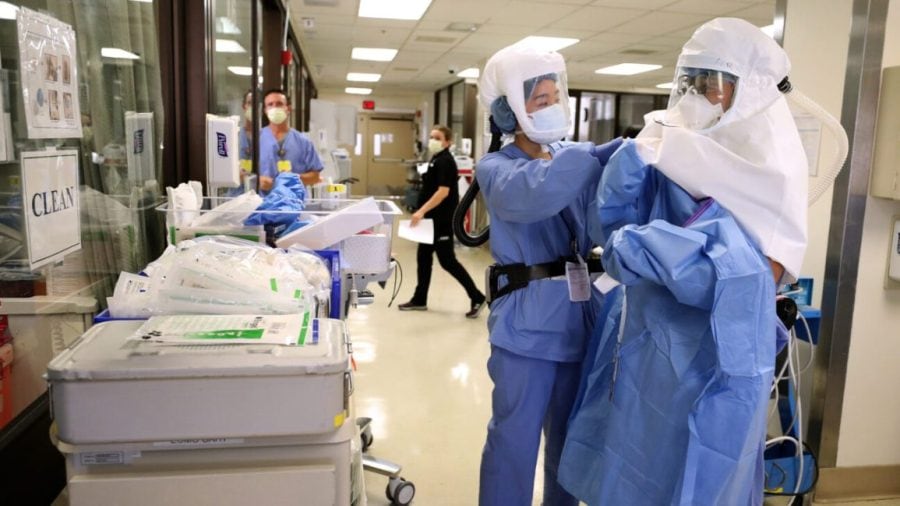As the pandemic spreads across the globe, the World Health Organization (WHO) has added “lifesaving” interleukin-6 receptor blockers to its list of COVID-19 therapies — just the second medication to be approved as effective against the illness.
The medications performed especially effectively, according to the WHO, when combined with corticosteroids, which were recommended by the WHO in September 2020.
“These drugs offer hope for patients and families who are suffering from the devastating impact of severe and critical COVID-19,” WHO Director-General Tedros Adhanom Ghebreyesus said in a statement.
Patients with severe COVID-19 often suffer from an immune system overreaction, which is suppressed by the interleukin-6 inhibiting medications tocilizumab and sarilumab.
According to the WHO, studies indicated that giving the medicines to seriously sick patients resulted in 15 fewer fatalities per 1,000 patients. The treatment of interleukin-6 in critically sick patients resulted in as many as 28 fewer fatalities per 1,000 patients. In comparison to conventional treatment, the medications lowered the likelihood of severe and critically sick patients being placed on a ventilator by 28%.
The advice comes as nations across the globe, including South Africa, Indonesia, and Bangladesh, are dealing with catastrophic new waves of the virus, which are fueled by the Delta strain, which first appeared in India. At the World Trade Organization, an initiative is currently underway to remove patent protections for COVID-19 vaccinations in order to increase access for poorer countries, and there are demands to eliminate intellectual property restrictions on medicines that are critical to the successful treatment of severe coronavirus.
For extremely sick COVID-19 patients, a box of tocilizumab, which is normally used to treat rheumatoid arthritis, has now been suggested.
Tocilizumab is a kind of medicine known as a monoclonal antibody (mAb) that is used to treat a variety of illnesses, including arthritis and cancer. It is made by Roche, a Swiss pharmaceutical company. The medication is marketed under the trade name Actemra.
Doctors Without Borders (MSF) asked Roche to reduce the price of the medication to make it cheap and accessible, and to share the know-how, master cell lines, and technology to enable other manufacturers across the globe to produce the therapy as well, in response to the WHO request.
In a statement, Julien Potet, a neglected tropical diseases policy adviser at MSF’s Access Campaign, said, “This drug could become essential for treating people with critical and severe cases of COVID-19 and reduce the need for ventilators and medical oxygen, which are scarce resources in many places.”
“Roche must stop following a business-as-usual approach and take urgent steps to make this drug accessible and affordable for everyone who needs it by reducing the price and transferring the technology, know-how and cell lines to other manufacturers. Too many lives are at stake.”
The majority of current mAbs are prohibitively costly for low- and middle-income nations.
While tocilizumab has been on the market since 2009, MSF stated the price has remained very expensive in most countries, ranging from $410 in Australia to $646 in India and $3,625 in the US for a 600mg dosage of COVID-19. The cost of producing tocilizumab is expected to be as low as $40 per 400mg dosage, according to the company.
Sarilumab, the second mAb recommended by WHO, is manufactured by Regeneron and Sanofi and sold under the brand name Kevzara. According to MSF, Regeneron has filed for and received patents on sarilumab and its formulation in at least 50 low- and middle-income countries.
Manufacturers were also urged by the WHO to lower medication prices, adopt transparent, non-exclusive licencing arrangements, or renounce exclusive rights.
“IL-6 receptor blockers remain inaccessible and unaffordable for the majority of the world,” Ghebreyesus said.
“The inequitable distribution of vaccines means that people in low- and middle-income countries are most susceptible to severe forms of COVID-19. So, the greatest need for these drugs is in countries that currently have the least access. We must urgently change this.”
The advice comes after a review of data from over 10,000 individuals who took part in 27 research studies.










